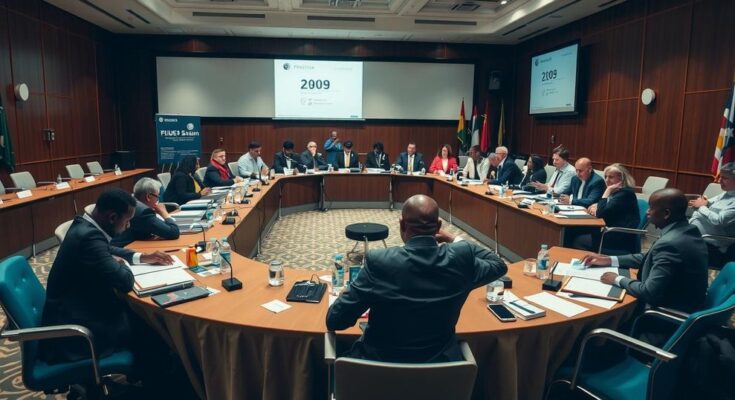COP 29 failed to provide adequate climate financing for developing countries, setting back efforts to combat climate change. With a target of $1.3 trillion unmet, the outcomes highlight a troubling lack of support from wealthier nations. As current commitments risk increasing global temperatures, the need for political accountability and novel financing methods, including taxing the affluent, is critical for sustainable climate action.
The COP 29 climate finance summit has been deemed a dismal failure for Africa and other developing nations, primarily because it failed to deliver substantive financial commitments. Delegates from these countries attended with the hope of securing $1.3 trillion annually to address climate challenges. Instead, they encountered a session that diverted discussions from ambitious climate finance goals, leading to inadequate outcomes that contravene previous climate agreements and risk pushing the global temperature rise well above safe limits.
The Nationally Determined Contributions (NDCs) are essential to the implementation of the Paris Agreement, but current proposals are not on track to meet the 1.5-degree target. Even implemented in their entirety, the existing NDCs would still lead to a disastrous 2.8-degree rise by the century’s end. Developing countries face severe challenges in achieving these targets due to insufficient financial support, which hinders their progress toward sustainable development.
The principle of common but differentiated responsibilities emphasizes that well-off nations should assist less advantaged countries through financial and technical aid. However, COP 29 revealed a persistent gap in such support, ultimately failing to safeguard vulnerable populations from the adverse effects of climate change. Furthermore, historical polluters have not accepted their role in the ongoing climate crisis, instead shifting the burden of responsibility onto those who are already suffering the consequences of their actions.
Fadhel Kaboub, a Senior Advisor at Power Shift Africa, commented, “You will hear a lot of talk about the so-called ‘tripling’ of climate finance at COP29… The mobilization of $300 billion/year by 2035 is a misleading figure.” Even at a modest 5% inflation rate, the value of this mobilized funding would translate to approximately $175 billion in 2024 dollars, a stark comparison to the $163 billion African nations are currently paying in debt service.
The reliance on carbon markets, which many see as a solution for climate financing, is increasingly under scrutiny. Evidence suggests that these markets often merely constitute greenwashing and fail to provide real emission reductions. Mohamed Adow, Director of Power Shift Africa, stated, “the carbon market rules will allow the richest to continue polluting, placing at risk the 1.5C target, while shifting the burden to developing countries.”
We face a global adaptation deficit where developing countries require $400 billion annually, yet COP 29 only aims for $300 billion in climate finance—an unrealistic and inadequate figure. The world is not lacking the financial means for climate action, as highlighted by the record fossil fuel subsidies totaling $1.7 trillion in 2022. There is a pressing need for political will to eliminate these subsidies and redirect resources to actual climate initiatives.
Advocacy for more robust climate finance targets is essential, particularly through taxation of wealthy individuals and polluting corporations. Implementing a wealth tax would not only hold the affluent accountable for their environmental impact but also generate vital resources for addressing the climate emergency. This approach is necessary for fostering a fairer global society and confronting the broader economic inequalities exacerbated by climate change.
The consequences of climate change disproportionately affect developing nations, which often lack the resources to adapt to or mitigate these effects. As a result, they depend heavily on climate finance from wealthier, historically polluting countries. Climate finance plays a critical role in tackling climate-related issues and supporting sustainable development. The outcomes of COP gatherings, like COP 29, directly impact these nations’ abilities to respond effectively to climate challenges. COP 29 was expected to advance the commitments made in the Paris Agreement but, in practice, fell short of the necessary financial support for developing countries, reflecting the ongoing global injustices in addressing environmental issues.
The outcomes of COP 29 signify a troubling inadequacy in climate finance, particularly for developing nations that remain on the frontline of climate impacts. With insufficient financial backing and support mechanisms, the commitments made at this summit are unlikely to foster the necessary changes to mitigate climate change effectively. Future progress hinges on holding wealthier nations accountable and ensuring that climate finance targets reflect the urgent needs of vulnerable populations, alongside a meaningful transition towards sustainable solutions. The need for a wealth tax and additional financial resources must be prioritized to tackle the climate crisis effectively.
Original Source: www.greenpeace.org




